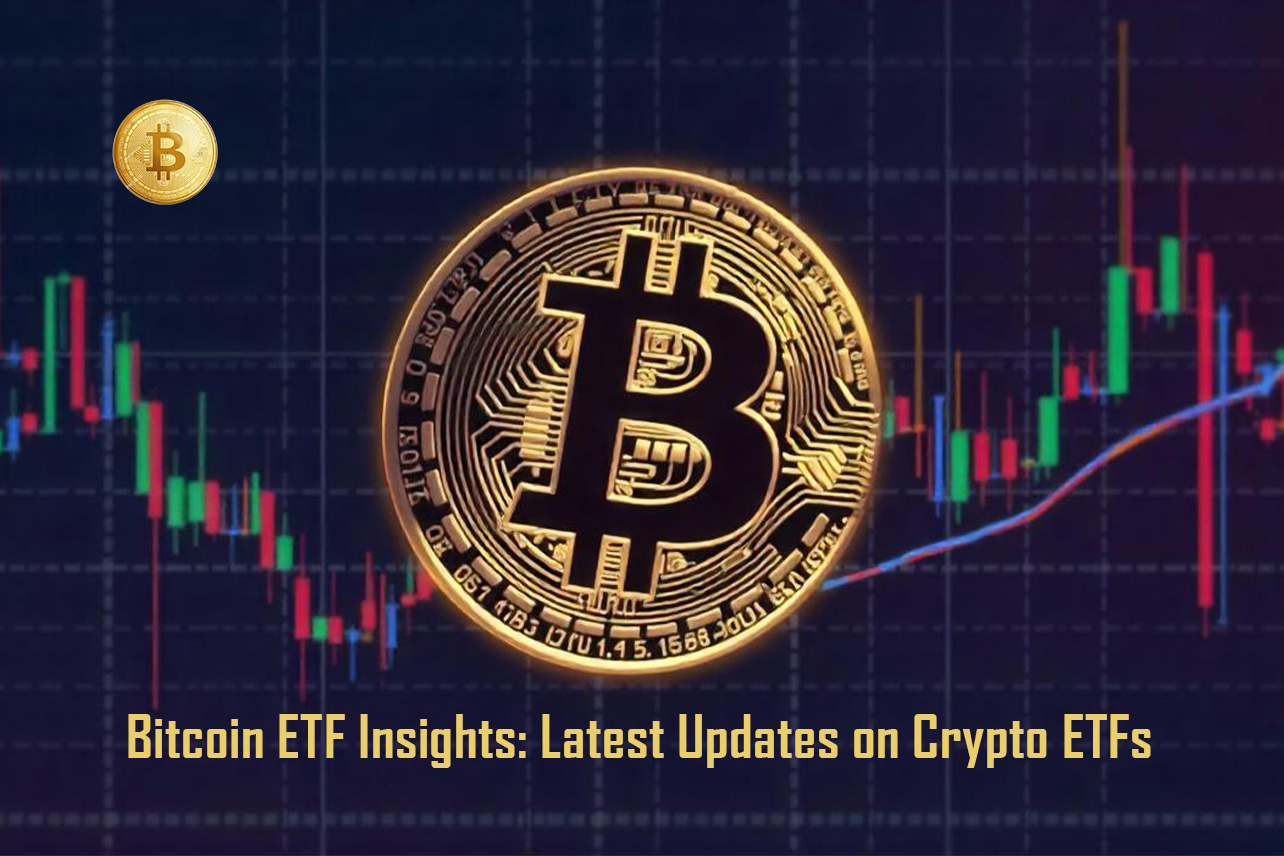Bitcoin ETF Insights: Latest Updates on Crypto ETFs

Table of Contents
- Introduction
- What is a Bitcoin ETF?
- BlackRock Bitcoin ETF: A Game Changer?
- Bitcoin Spot ETF: The Holy Grail of Crypto Investing
- Fidelity’s Bitcoin ETF and Market Competition
- The Road to Bitcoin ETF Approval
- Key Benefits of Bitcoin ETFs
- Risks and Challenges of Bitcoin ETFs
- FAQs on Bitcoin ETFs
- Conclusion
1. Introduction
The intersection of cryptocurrency and traditional finance has never been more exciting, thanks to the growing buzz around Bitcoin ETFs. As major players like BlackRock and Fidelity throw their hats into the ring, these financial products are capturing the imagination of both seasoned and novice investors. But what exactly is a Bitcoin ETF, and why does it matter? Let’s break it all down.
2. What is a Bitcoin ETF?
A Bitcoin ETF (Exchange-Traded Fund) allows investors to gain exposure to Bitcoin without owning the cryptocurrency itself. These ETFs track the price of Bitcoin, offering an easier and more regulated way to invest in the crypto market.
There are two main types of Bitcoin ETFs:
- Futures-based ETFs: These rely on Bitcoin futures contracts, which track the anticipated future price of Bitcoin.
- Spot-based ETFs: These are backed by actual Bitcoin holdings, directly correlating to the cryptocurrency’s market price.
The latter—Bitcoin spot ETF—is often considered the gold standard for crypto investors.
3. BlackRock Bitcoin ETF: A Game Changer?
When BlackRock, the world’s largest asset manager, filed for a Bitcoin ETF, it sent ripples through the market. The company’s reputation and influence lend legitimacy to a crypto-linked financial product.
BlackRock’s proposal centers around a Bitcoin spot ETF, designed to offer investors direct exposure to Bitcoin prices. Its entry into this space signals a shift in traditional finance’s attitude toward cryptocurrencies, with many viewing it as a potential catalyst for wider adoption.
4. Bitcoin Spot ETF: The Holy Grail of Crypto Investing
The demand for a Bitcoin spot ETF has been rising for years. Unlike futures-based ETFs, which rely on speculative contracts, a spot ETF would hold actual Bitcoin, providing investors with a more transparent and reliable investment vehicle.
Despite the demand, regulatory hurdles have delayed approvals in the U.S., with concerns around market manipulation and investor protection. However, with heavyweights like BlackRock and Fidelity advocating for these products, the tides could soon turn.
5. Fidelity’s Bitcoin ETF and Market Competition
Not to be outdone, Fidelity has also applied for a Bitcoin ETF, intensifying competition among major financial institutions. Fidelity’s reputation as a trusted investment firm makes its entry significant, as it could help bridge the gap between traditional and crypto-focused investment strategies.
By offering products like the Fidelity Bitcoin ETF, these companies aim to tap into the growing demand for regulated crypto exposure, particularly among institutional investors.
6. The Road to Bitcoin ETF Approval
The journey toward Bitcoin ETF approval has been anything but smooth. Regulatory bodies like the SEC have expressed concerns over:
- Market manipulation risks
- Lack of investor protections
- Volatility in the cryptocurrency market
However, recent developments suggest that regulators are warming to the idea, especially with companies emphasising compliance and transparency. If approved, Bitcoin ETFs could mark a turning point for the crypto market, attracting a wave of new investors.
7. Key Benefits of Bitcoin ETFs
Why all the hype? Here’s what makes Bitcoin ETFs an appealing choice for investors:
7.1 Simplicity
With a Bitcoin ETF, there’s no need to manage private keys, digital wallets, or exchanges. It’s a straightforward way to gain exposure to Bitcoin.
7.2 Regulation
ETFs are regulated financial products, offering a safer and more secure alternative to directly investing in cryptocurrencies.
7.3 Accessibility
Bitcoin ETFs make it easier for retail and institutional investors to participate in the crypto market through familiar platforms like brokerage accounts.
8. Risks and Challenges of Bitcoin ETFs
While Bitcoin ETFs offer exciting possibilities, they’re not without risks:
8.1 Price Volatility
Bitcoin’s price volatility directly impacts the value of Bitcoin ETFs, making them a high-risk investment.
8.2 Regulatory Uncertainty
Delays and potential restrictions could impact the performance and adoption of Bitcoin ETFs.
8.3 Management Fees
ETF management fees can eat into profits, especially for long-term investors.
9. FAQs on Bitcoin ETFs
Q: What is a Bitcoin ETF?
A: A Bitcoin ETF is a financial product that tracks Bitcoin’s price, allowing investors to gain exposure without owning the cryptocurrency directly.
Q: What is the difference between a spot Bitcoin ETF and a futures Bitcoin ETF?
A: A spot ETF holds actual Bitcoin, while a futures ETF relies on contracts predicting future Bitcoin prices.
Q: Why is the BlackRock Bitcoin ETF significant?
A: BlackRock’s entry into the Bitcoin ETF market signals growing mainstream acceptance of crypto as a legitimate asset class.
Q: When will Bitcoin ETFs be approved in the U.S.?
A: Approval timelines are uncertain, but increasing pressure from major financial institutions suggests progress is being made.
Q: Are Bitcoin ETFs a good investment?
A: Bitcoin ETFs offer a regulated way to gain exposure to Bitcoin but come with risks like price volatility and management fees.
10. Conclusion
The introduction of Bitcoin ETFs represents a monumental shift in how investors access the crypto market. With major players like BlackRock and Fidelity leading the charge, these products could pave the way for broader adoption of cryptocurrency as a mainstream asset class.
While challenges remain, the potential benefits of Bitcoin ETFs—simplicity, accessibility, and regulation—make them an exciting prospect for the future. Whether you’re a seasoned investor or crypto-curious, Bitcoin ETFs are worth keeping an eye on as the market evolves.




